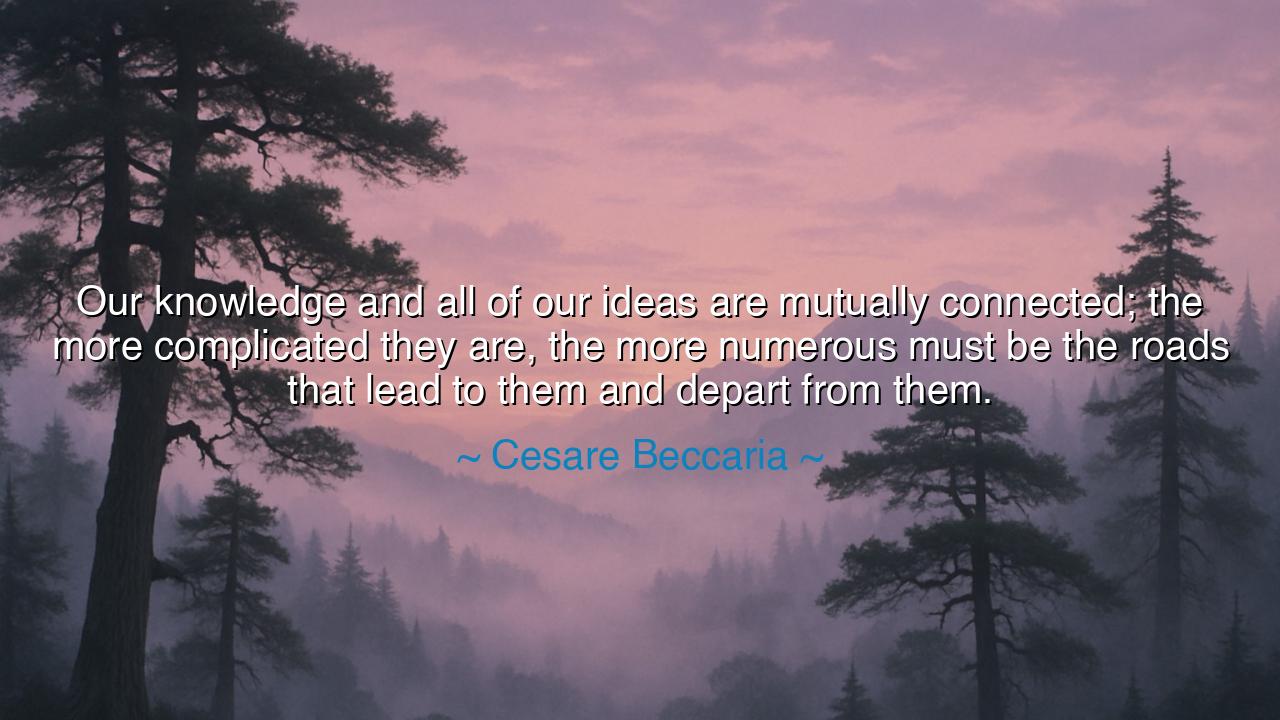
Our knowledge and all of our ideas are mutually connected; the
Our knowledge and all of our ideas are mutually connected; the more complicated they are, the more numerous must be the roads that lead to them and depart from them.






In the profound and timeless words of Cesare Beccaria, philosopher and reformer of the Enlightenment, we are given a vision of the mind as a vast and living network: “Our knowledge and all of our ideas are mutually connected; the more complicated they are, the more numerous must be the roads that lead to them and depart from them.” These are not the cold musings of a scholar lost in abstraction, but the reflections of a man who saw in the web of thought the architecture of all human progress. Beccaria reminds us that knowledge is not a solitary pillar rising into the sky, but a living city of ideas — its avenues intertwined, its paths converging and parting in endless complexity.
The origin of this quote lies in Beccaria’s devotion to reason and enlightenment. A thinker of 18th-century Italy, he is most remembered for his work On Crimes and Punishments, in which he challenged the cruelty and injustice of his age. But beneath his advocacy for reform was a deeper philosophy — a belief in the power of reason as a unifying force. To him, every idea was connected to others, forming the great structure of human understanding. Justice was linked to morality, morality to society, society to education, and education to the freedom of thought itself. In his words, we hear the voice of an era that believed that by connecting ideas rightly, humanity could build a better world.
Beccaria’s insight is both logical and poetic. When he speaks of roads leading to and from ideas, he paints the mind as a landscape of connection — a map of discovery. The more profound an idea, the more paths must touch it, for deep truths are never born of isolation. They are the meeting points of many disciplines, many minds, many generations. Just as a mighty city stands at the crossing of rivers and roads, so too does great wisdom arise where many streams of thought converge. Knowledge, then, is not the domain of the few, but the shared inheritance of the many — a web woven by countless hands.
Consider the life of Leonardo da Vinci, who embodied this truth with every brushstroke and design. To Leonardo, knowledge was one — art, science, mathematics, and nature were but faces of the same divine order. His studies of anatomy informed his painting; his observations of water shaped his engineering. Each thought led to another, every discovery opened new doors. He understood, as Beccaria taught, that the more complex a truth becomes, the more connections it demands. Leonardo’s genius was not in knowing more than others, but in seeing how all things are linked — how every idea, like a thread, is bound to the fabric of the universe.
This wisdom also teaches humility. For if all ideas are connected, then no single idea belongs entirely to one mind. Every insight builds upon the labor of countless others — thinkers, teachers, friends, and even opponents. The roads that lead to our own understanding are paved by those who came before, and from our knowledge, new paths will depart to guide others. Thus, Beccaria’s vision humbles the scholar and ennobles the learner: it tells us that wisdom is not ownership but stewardship, not possession but participation in the eternal dialogue of humankind.
Yet, there is also a warning in his words. If knowledge is a network, then the breaking of its connections — the refusal to see ideas as related — leads to ignorance and decay. When men divide knowledge into silos, when they cling to single truths without seeing their relation to the whole, they become lost travelers on unmarked roads. The mind that isolates one truth from all others becomes narrow and brittle. The wise must therefore cultivate curiosity, for it is curiosity that keeps the roads open, that drives us to trace new paths from one idea to the next, until understanding becomes complete.
Let this, then, be the lesson of Cesare Beccaria: build connections between your thoughts as a builder joins stones with mortar. When you learn something new, seek not only to understand it, but to see where it fits within the greater order. Let your knowledge grow not in height alone, but in breadth — reaching outward to touch the many branches of the human spirit. Read widely, question deeply, and let each idea you encounter lead you to another.
For the mind, like a great city, thrives not by standing still, but by the movement of its people — the constant traffic of ideas, dreams, and discoveries flowing through its streets. And in the end, as Beccaria so wisely teaches, it is in these crossings, these endless roads of thought, that civilization finds both its wisdom and its soul.






AAdministratorAdministrator
Welcome, honored guests. Please leave a comment, we will respond soon